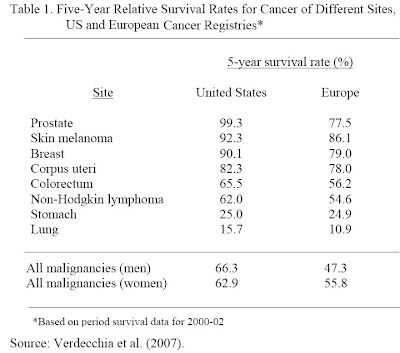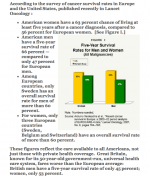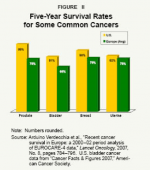Re: Don't get Cancer in the UK ~ what I fear about ObamaCare
We do spend more per captia for healthcare. Life expectancy is a hard number too. These facts dont change. We have the most expensive healthcare system in the world and dont live long enough to get our money's worth. Saying life expectancy is not due to the medical is kinda cute, but not true.
http://scienceblog.cancerresearchuk...careful-when-comparing-us-and-uk-cancer-care/
We need to be careful when comparing US and UK cancer care
The US healthcare system is being reformed
It’s often said that where the US goes, we Brits will follow – and that’s certainly been true over the last week or so.
America is in the middle of a lengthy, bitter and at times bizarre debate, as President Obama tries to reform the US healthcare system. And as the debate has spilled over into the British media, focus has fixed on the relative pros and cons of our NHS.
As well as becoming the focus of newspaper columns and radio phone-ins, the debate has also set the internet alight, with commentators on both sides feeling compelled to ‘have their say’, as exemplified on social microblogging site Twitter.
Given that both the US and the UK economies are in recession, and both countries are facing spiralling healthcare costs as their populations age, it’s absolutely right that we have a proper and informed debate about how best to provide healthcare.
Cancer is a key area of concern for healthcare providers, not least because alongside demographic and economic problems, new-generation cancer treatments tend to be more expensive than their forerunners.
But over the last week, facts and figures about UK cancer care have been taken out of context on several occasions, and used to make questionable points about the NHS. So let’s set the record straight.
‘Breast cancer kills more frequently in the UK’
One stat that we were asked to comment on is a statistic comparing breast cancer death rates in the two countries:
Breast cancer kills 25 percent of its American victims. In Great Britain …breast cancer extinguishes 46 percent of its targets.
We don’t know where this figure has come from. However, according to GLOBOCAN – an international comparison carried out in 2002 and probably the most recent comparable figures, the age-standardised figures are 24 deaths per 100,000 Britons, and 19 per 100,000 Americans – not nearly so dramatic a difference.
‘Fewer prostate cancer patients survive five years’
Another fact that has been widely quoted relates to prostate cancer. As the Guardian wrote:
A Lancet Oncology global study last year found that 91.9 per cent of Americans with the disease were still alive after five years compared to just 51.1 per cent in the UK.
On the face of it, these figures are indeed valid. They come from the CONCORD study, which we helped fund, and compared 5-year survival rates between many different countries.
But just comparing the US and the UK, and saying that the bigger number is ‘better’, misses a deeper truth.
As we’ve written before, the US uses the PSA blood test far more widely than we do in the UK – despite questions over how effective it is at spotting cancers that would actually kill, as opposed to those that cause no symptoms.
As a result, the USA has one of the
highest recorded rates of prostate cancer in the world.So although it’s undoubtedly ‘better’ at spotting prostate cancers, it’s also fair to say that some of these Americans will never die from their disease.
This ‘overdiagnosis’ inflates the survival statistics, at the expense of ‘overtreating’ men – which is expensive and can cause long-term side effects (which can need further treatment).
So you might just as well argue that the ‘91 per cent’ survival figure could be due to a system that overdiagnoses and overtreats prostate cancer, as opposed to saying our 51 per cent stat is due to poor healthcare in the UK. Bigger is not always better.
Finally, if you look at UK survival rates for early stage prostate cancer, a different picture emerges – men in the
UK have a 98.6 per cent five-year survival rate. Clearly, whatever controversies surround the diagnosis of the disease, the NHS is doing a pretty good job of managing it when it’s detected early.
‘UK cancer patients find it harder to see an oncologist’
According to the Mirror, some US anti-reform adverts have been stating that 40 per cent of UK cancer patients “are never able to see an oncologist”. This figure originates from a report titled “Review of the pattern of cancer services in England and Wales” published by the Association of Cancer Physicians in 1994 – years before the NHS Cancer Plan and the Cancer Reform Strategy were put in place.
But things have improved hugely since 1994, thanks to the priority the UK government has placed on cancer care. Nowadays, the vast majority of cancer patients in the UK see a specialist within two weeks.
The dangers of international comparison
Another big difference between UK and US cancer statistics is that in the UK, every single cancer diagnosis and death is registered nationally. In the US there is not nearly such complete data. So even comparing data that’s been properly standardised doesn’t give the whole picture – as we mentioned when discussing the EUROCARE european data a while back.
But it’s only valid to compare international statistics, of any sort, if you compare like with like – and this is extremely difficult to do between different populations, especially when the nature of the data is fundamentally different.
We’re not saying the NHS is perfect. There’s a long way to go with many aspects of cancer care – early diagnosis, access to treatment, and end of life care, to name a few. But the picture that’s currently being painted in some quarters is very different from the reality.
And that reality is a picture where UK death rates from all cancers have fallen by almost 20 per cent in the last 40 years, and where overall five-year survival figures have doubled over the last 30.
Death rates for three of the most common cancers – breast, bowel and male lung cancer – have all dropped to their lowest levels in 40 years. And since the NHS was founded 60 years ago, survival for breast and bowel cancers has more than doubled.
The patient perspective
As a final note, the statistics we’ve discussed in this post are, by their very nature, averages.
But when you’re diagnosed with cancer, doctors generally give you statistics that are more relevant to the type or stage of disease you yourself have – and these may be different from those above.
If you are a cancer patient, or know someone who is, and you have question about cancer, its treatment or care, have a look at our patient information website CancerHelp UK, or telephone our Information Nurses on freephone 0808 800 4040.












 And I'm approaching that vaunted "five-year-survival" point.
And I'm approaching that vaunted "five-year-survival" point. Some of us really would appreciate the perspective of a medical professional who has worked both side of the Atlantic.
Some of us really would appreciate the perspective of a medical professional who has worked both side of the Atlantic.